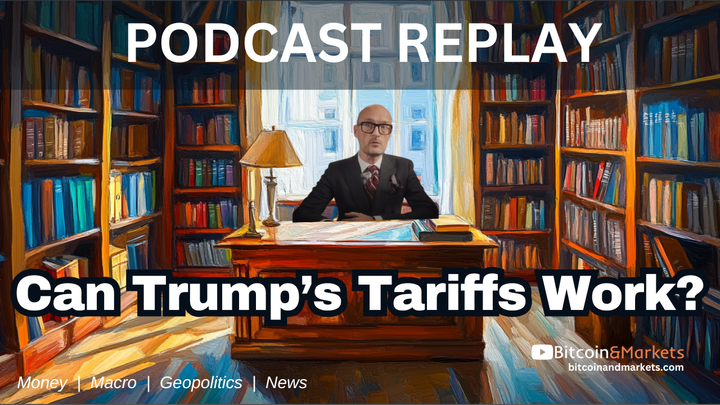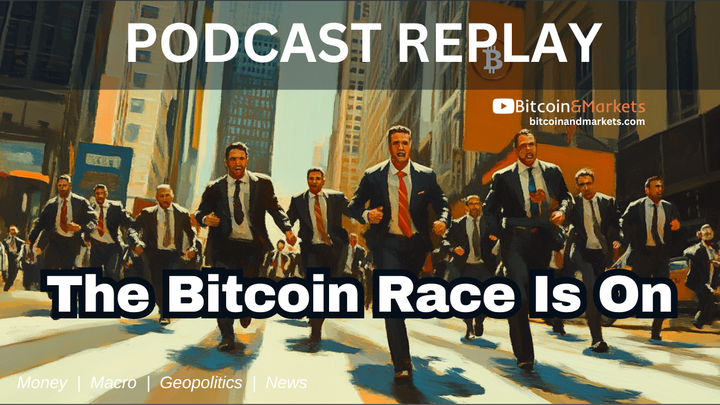A Little Bitcoin Game Theory - E237
I discuss bitcoin's game theory, cooperative games, infinite vs finite games, changing the rules, and the game theory of nation-state adoption.

In this episode, I discuss two articles on bitcoin's game theory by Jeremy Garcia, which appeared first on Bitcoin Magazine. I take a critical stance on many parts of his analysis, but I think it is important that there is more discussion on this topic. I thank Jeremy for writing them. I discuss bitcoin's game theory, cooperative games, infinite vs finite games, changing the rules, and the game theory of nation-state adoption.
Article 1: A Look at the Game Theory of Bitcoin
Hypothesis link for my highlights and comments HERE
Article 2: Bitcoin's Game Theory has Endless Possibilities
My highlights and comments HERE
In summary, my position is this. In economics, most games are cooperative by nature. Humans, almost exclusively, coordinate together in a peaceful and cooperative manner. Free markets are one big cooperation mechanism that make it very hard to defect, except in some specific direct competition. The theory of collusion and defection, we often think about in economics, is solely concerned with this exception, not the general rule. Therefore, when Jeremy says that game theory is about countering your opponent, I disagree when it comes to economics.
We must also be careful not to anthropomorphize bitcoin as a player in the game. Bitcoin has changed the rules of the game, it has upgraded the chessboard to that cool 3D-version from Star Trek, or one with bitcoin orange squares. The old players of the game, which Jeremy identifies as the World's Most Powerful Players (WMPPs) are desperate to maintain the old rules and the old chessboard, because they had a commanding position.
The chessboard of life is constantly changing. The reason the WMPPs will fail is because they are trying to force a win/lose battle in an infinite game. All the underdog has to do is change the rules of the game. That is what bitcoin is. It is a monumental upgrade to the rules of the game.
The second half of the podcast follows the second article by Jeremy. This one centers more around the general path of bitcoin adoption from an incentive-based perspective. It gives me the opportunity to highlight the fact that bitcoin will likely not help the poorest countries, since they have been built up expressly in the credit era. Remove easy credit and most emerging markets will return to 3rd world status.
Lastly, in regards to the US adoption of bitcoin, and its currency's status as global reserve currency. The US will always be the primary world superpower for the foreseeable future, not because of "American exceptionalism" or the perfect nature of our union, or some better moral nature of our people. The US will remain a dominant country simply because of geopolitical and geoeconomic realities.
It is the most blessed piece of real estate on the planet with regards to economic productivity, and will remain so into the future. It has a mix of people and beliefs which our system masterfully balances. While we experience political extremes, there is a pendulum between them.
Therefore, whatever is the currency of the US will almost certainly be the global reserve currency. If we believe for separate reasons that bitcoin is the best money and will inevitably be the global reserve currency, that means the US will inevitably adopt it. Everyone will.
A
Get The Bitcoin Dictionary!
Bitcoin jargon demystified. Over 180 Bitcoin terms, concepts, and idioms.
The Best Free Bitcoin Newsletter!
Don't miss another issue. Subscribe to the Free tier!
Subscribe to the Pod!
iTunes | Stitcher | Google Pods | YouTube | Soundcloud | RSS
The Show Needs Your Support
We’re a small operation and producing quality content people find valuable.
Check out our big list of ways to help the show
Affiliates
- Chart Like A Pro With TRADINGVIEW
- The Best WordPress Theme I’ve Ever Used! GeneratePress
- Sign Up For Audible And Get 2 FREE Audio Books
Have Feedback? All feedback is welcome!
**DISCLAIMER: This is not investment advice, do your own research.**




